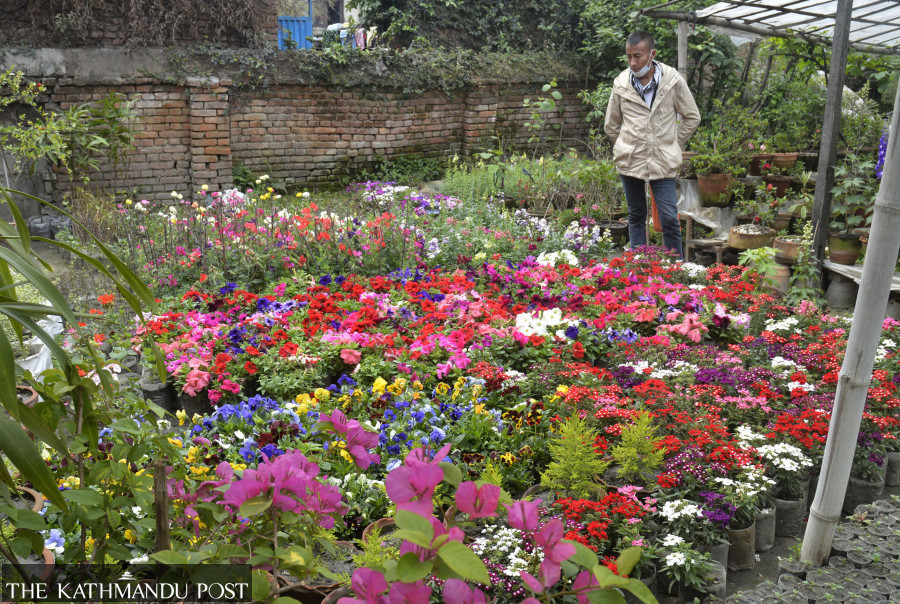Money
Flower industry wilts as social events are scaled back
Demand has plunged as seminars, meetings and weddings have been banned in the last one and a half years.
Krishana Prasain
Business was blooming for Krishna Ram Thapa, proprietor of Thapa Nursery in Kirtipur, during the last two and a half decades. And then Covid dealt a cruel blow.
“Sales are down by over 80 percent,” said Thapa, who grows fruits and flower plants on 4 ropanis of land for which he pays a monthly rent of Rs70,000.
Thapa said his monthly expenses amount to more than Rs600,000 including the rent, staff salaries, and cost of seeds and fertiliser. “But we barely earn Rs400,000 per month.” Thapa has to borrow the rest of the money.
Insiders say the good days do not look like returning anytime soon for flower growers because people are not celebrating much due to the Covid-19 pandemic, which has killed more than 10,000 people since the outbreak started in early 2020.
Demand for flowers has plunged as seminars, meetings and auspicious events like weddings have been banned in the last one and a half years. Places of worship have also remained shuttered for a long time, and people stopped buying flowers. The tourism sector lies moribund as no tourists are coming, and this has impacted demand too.
Amid the pall of gloom, entrepreneurs express bitterness at the lack of government support and uncontrolled imports of flowers.
Kumar Kasaju Shrestha, president of the Floriculture Association Nepal, said that Nepal's flower business was worth more than Rs2.61 billion annually before Covid-19.
"Now, the yearly turnover has dropped by almost half to Rs1.5 billion. We estimate that around 25 percent of the entrepreneurs involved in floriculture have left the business,” he said.
Before the pandemic, there were more than 1,000 entrepreneurs involved in floriculture in 57 districts, and the sector was providing 50,000 direct and indirect jobs. “Now, around 35 percent of the jobs have disappeared.”
The flower acreage in Nepal is 163 hectares, according to the association.
The country imported cut flowers and flower plants valued at nearly Rs260 million in the fiscal year 2019-20. Imports soared to Rs380 million in the last fiscal year 2020-21. Nepal imports most of its cut flowers and flower plants from India.
“Flowers imported from Europe are getting easy access to the local market, but there are few buyers for flowers grown in Ramkot or Kabhre,” Shrestha said.
Domestically produced flowers face difficulty in finding a market due to the imported products, Shrestha said.
“The government is import oriented instead of supporting domestic production. This has led flower farmers to look for alternative sources of income or go abroad as migrant workers,” he said.
Floriculture entrepreneurs said flowers worth millions of rupees had to be destroyed in the fields as there were no sales during the lockdown. Since Nepal does not have a flower processing industry, farmers can sell only fresh flowers; and entrepreneurs were compelled to leave their flowers in the fields to rot. Flowers are highly perishable goods.
Floriculture entrepreneurs complain their products are not included in e-commerce platforms and are not sold online.
As most of the floriculture enterprises come under micro and cottage scale industry, many are running their businesses by taking loans from cooperatives. “Floriculture entrepreneurs are not getting facilities as mentioned in the monetary policy that included refinancing service,” Shrestha said.
The government should introduce refinancing at minimum interest to protect small entrepreneurs, Shrestha added. Micro and small cottage industries have been helping to create jobs and contributing to keep up with economic activities. “But there is lack of support from the government.”
According to Shrestha, the country’s flower output is enough to fulfil 91 percent of the domestic requirement. The rest is met by imports.
There is good demand for cut flowers in the domestic market as they are used as gifts and decoration at weddings, seminars, offices or even at homes. Demand for garlands and flower plants, especially perennial plants, has also been increasing in recent times.
The country exported flowers valued at Rs220 million in fiscal 2009-10, which had encouraged many to join the floriculture business. But shipments dropped to a low of Rs3.3 million in the last fiscal year ended mid-July due to trade and transport barriers, Shrestha said.




 9.89°C Kathmandu
9.89°C Kathmandu















